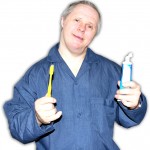
People with learning disabilities are more likely to have tooth decay, loose teeth, have gum disease, show higher levels of untreated disease and also have a larger number of extractions than those without disabilities, although evidence does exist to suggest that well-performed preventive procedures can prevent progression of dental disease and reduce tooth loss.
The researchers in this US study were interested in whether or not a training programme for support workers could improve their support in oral hygiene of the people they support The researchers used a quasi-experimental one-group pretest/posttest design with repeated measures.
They worked with a number of support staff who went through an educational programme. Firstly they demonstrated oral hygiene skills on each other and were scored whilst doing this by a trained observer. They also completed an oral hygiene compliance survey.
The researchers then carried out a three month follow-up which included the demonstration of oral hygiene skills and a repeat of the compliance survey.
They used paired-sample t-tests to test oral hygiene knowledge. These tests compare the means of two variables and enable researchers to see if the average difference is significantly different from zero and so prove a statistically significant outcome. These tests did show a statistically significant improvement from pretest to posttest and from pretest to three-month posttest They found that oral hygiene skills and compliance had improved.
The authors conclude that their results show
evidence that caregiver education improves knowledge, skill, and compliance in oral hygiene.
Effectiveness of a Caregiver Education Program on Providing Oral Care to Individuals with Intellectual and Developmental Disabilities, Fickert N & Ross D in Intellectual and Developmental Disabilities: June 2012, Vol. 50, No. 3, pp. 219-232.

Most Community [Salaried] Dental Services have experienced teaching staff able to provide appropriate training to support staff.
Hi Michelle,
Thanks for your comment. It would be good to hear if any of our UK readers have received training from community dental services staff and what their experience was. john
Hi John and Michelle
I work for the Community Dental Service and our role is to provide dental treatment and health interventions/promotion to support vulnerable people, specifically those with learning disabilities and complex needs who are unable to attend a general dental practitioner. My remit is to specifically support vulnerable adults and I provide an oral health training programme for carers. This not only increases carers oral health knowledge and skills but raises self esteem and confidence when providing mouth care. I would suggest you contact your local Health Board or Primary Care Trust for support.
Hope this helps. Ros
Hi Ros,
thanks for your comment and useful information and advice. It would be good to get some comments from anybody who has had training to get some first hand stories of how this has improved confidence,
best wishes
john